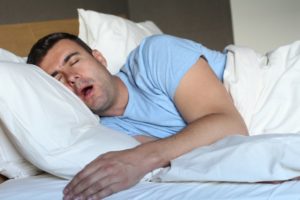 Is it common for you to wake up in the morning with a wet spot on your pillow from drooling while you sleep? This can be quite embarrassing, but you’re not left to just deal with this problem. Your dentist in Brookfield gives some reasons for why this may be happening and solutions for how to prevent and correct the situation. Read on to learn more!
Is it common for you to wake up in the morning with a wet spot on your pillow from drooling while you sleep? This can be quite embarrassing, but you’re not left to just deal with this problem. Your dentist in Brookfield gives some reasons for why this may be happening and solutions for how to prevent and correct the situation. Read on to learn more!
Let’s Get to the Source!
Waking up to a saliva covered face and pillow is not something that you’re proud of. The first place to start in finding solutions is to understand what causes this problem. Thus, let’s take a look at the 7 most common contributors to nighttime drooling.
Improper Sleeping Position
Sleeping on one side of your stomach causes your mouth to open while you relax into a deeper sleep. A simple remedy is to position yourself on your back.
Allergies
A condition called allergic rhinitis (the result of an overactive immune system) and certain food allergies can contribute to excess drooling. Your primary care physician will be able to advise you on medications that can address this issue.
Acidity or GERD
One of the causes of increased acidity in the mouth is gastroesophageal reflux disease (GERD). This condition stems from a muscle at the top of the stomach failing to close properly, which allows the latter to leak its acidic contents into the esophagus. The increased acidity then contributes to excess saliva production.
Sinus Infection
If you’re suffering from an upper respiratory infection, then there’s a good chance that you’ll have some swallowing and breathing problems, which can lead to abnormal drooling. Another contributor is nasal passage blockage because it forces you to breathe more through your mouth, which also leads to increased saliva production.
Tonsillitis
At the back of your throat are glands called tonsils. When they become inflamed, the passage becomes narrow, thereby obstructing the drainage of saliva down the throat.
Sleep Disorders
If you suffer from certain sleep disorders that are triggered by emotional stress, then you may experience excessive drooling. This problem can be treated through the joint efforts of your dentist and primary care physician.
Drugs and Chemicals
A final contributor to drooling can be taking certain medications. For example, some antidepressants can cause increased saliva production. If you notice this happening to you, then reach out to your doctor. There’s a chance that some adjustments can be made to correct the issue.
The best way to treat a nighttime drooling issue is to be proactive. When you notice a change like this, don’t hesitate to contact your doctor and Brookfield dentist to get the expert care you need.
About the Author
Dr. Eric Taibl earned his dental degree from the University of Iowa College of Dentistry. For nearly a decade, he’s remained dedicated to communicating openly and effectively with his patients to ensure that they always understand the parameters of the care he’s providing. To stay abreast of the latest advancements in the field of dentistry, Dr. Taibl is a member of several professional organizations and provides exemplary care at Elmbrook Family Dental. He can be reached for more information through his website.
